There is a massive amount of fluidity these days because of the cultural diversity that you can witness in live audio broadcasts or television. Such difference is what gives us a wide range of understanding of the ethics of freedom. Ayinde Alakoye, the co-founder and CEO of nēdl, shares the value of allowing people to access any information and democratizing this access. As he walks us through his journey to becoming the CEO of the world’s first keyword search engine for live audio broadcast, discover the difference in the impact between podcasts and radios. Learn how Ayinde monetizes his search engine even if it is a free app to download. Also, catch on how he became the Message Advisor for President Obama.
If the freedom of speech allows any human being to exercise the right to express their opinions by all means, should there be any limitations to what should be aired out in the public or social media? Yonason Goldson, the Director of Ethical Imperatives, talks about being aware of and determining your responsibilities. He teaches professionals how good ethics is good business and the benefits of intellectual diversity. A keynote speaker, TEDx presenter, and community rabbi, Yonason gives an in-depth analogy on why compliance is the enemy of ethics. Likewise, he gives his take on sharing too much of our opinions and our values versus being too sensitive to other people’s reactions to them. As we dive deeper into ethics in politics and business, find out what the “fake it until you make it” mentality is and why you should dodge it.
We have Ayinde Alakoye and Yonason Goldson. Ayinde is the Cofounder and CEO of nēdl, the world’s first keyword search engine for live audio broadcast. Yonason is the Director of Ethical Imperatives, a TEDx speaker, rabbi, and all-around an interesting guy.
Listen to the podcast here
Live Audio Broadcasts: Democratizing Access To Information with Ayinde Alakoye
I am here with Ayinde Alakoye. He’s the Cofounder and CEO of nēdl, which sounds like a haystack. It’s the world’s first keyword search engine for live audio broadcast. He has served as an executive board member of the Developer’s Alliance and created iHeart‘s original app. You’ve seen him everywhere. He’s also been a speechwriter for presidential candidate Barack Obama. He has a very interesting background. I’m looking forward to chatting with you. Welcome.
Thank you so much.
Thank you for being on the show. I was really interested in what you do since we have an AM/FM broadcast. We also have a podcast and everything else. I want to talk about your work with nēdl but I want to get a little background on you. Can you talk about how you got to this point of cofounding and being a CEO of nēdl?
I can give you the short story. I’ll preface it with how I fell in love with radio. It was growing up in Washington DC. My mom was a widow but every morning growing up as she would be rushing us off to school and getting ready for work herself, she’d be listening to the radio and listening to Donnie Simpson. It wasn’t until years later that I realized I had a male voice in the household every morning because of the radio. I ended up not surprisingly getting into radio as an adult. It was my second real job out of college. I lucked out and worked for WTOP in Washington, DC AM station. I became the top salesperson there before I got recruited to come out to LA and do the same thing for KFI then Howard Stern after that.
It was around 2003 that I decided to start my own business. I didn’t realize that I was going to be in technology. I was trying to improve radio and that ended up in becoming the first permutation of the iHeartRadio app. In 2007 was when we partnered with Clear Channel. It was a couple of years before iHeart officially launched. We’re up to our third startup. Nēdl is an app that converts audio into text so that radio listeners can search live broadcasts as easily as they search the web by keyword, by artist, and by song. We’re going strong and we’re really excited.
What did you do with Howard Stern’s show?
I sold my airtime.
You were in sales there.
[bctt tweet=”Ethics ultimately governs the gray area between what’s legal and what’s illegal.” via=”no”]Not to be braggadocious but to give you a little bit of background, I was actually the top salesperson in LA for a hot minute, and then I got recruited by Howard Stern to do the same thing for him.
You’ve done just about everything and I have to admit, I did download your app. I watched one of your videos, the one where you were at one point getting some seed funding, and you were giving some statistics. Those are great statistics. A lot of people who are on the air like I am like to see the statistics because they’re hard to come by. A lot of these shows don’t necessarily buy into the ratings, numbers and get all of the data that we’d like to get. At that point, the thing I saw but you said it was close to 250 people are listening to the radio on a daily basis and about 4.3 billion globally. You also said that 92% of Millennials listened to the radio on a weekly basis. What are they listening? Are they listening to music? Are they listening to the news? Do you know any more about that number?
That number is a couple of years old. It spiked after the last presidential election. No surprise there. It was attributed to the news. It was 82% the year before and it went up 10% because people wanted to get more news. What we’re seeing is there’s a real big disconnect between Silicon Valley and what they invest in and what most people use. The hard facts are that most people in the US, 94% who are listening to the radio, more than half of them are earning less than $75,000 a year. That’s the reality for a lot of people. Radio does a huge service for them. Obviously, probably a lot of your audience is in a higher income bracket but radio really does serve the mass and it connects them. We separated it into two camps of people. There are the subscriptions and the subscription-less. The radio is for the subscription-less largely.
Are they listening to just radio? Do you have the information about podcasts at all? Podcasts earned $220 million in 2017 globally. When you say they earn that much, what do you mean by that?
The podcast numbers are surprising given the attention that they get from Silicon Valley. They’re actually getting the lion’s share of investments, but as of 2017, it was $220 million of global revenue compared to $44.1 billion of global revenue for advertising for radio. We’re talking about advertising revenue numbers. I’ve come from radio advertising that’s where I’ll talk about but it hasn’t changed much. Podcasting is growing like crazy but even if it’s $500 billion, it’s nowhere near radios’ multiple-billion-dollar numbers.
Is it the reach? What’s the difference? Why do you think podcasting doesn’t have the same impact?
Podcasts are really important and it is growing. It’s a life cycle. It’s not saying that podcasting won’t get bigger but if you think about podcasting as the actual word, it comes from iPod. Steve Jobs created the iPod and one of the five things that I stood for was individual. The iPod was for individual consumption, whereas radio is for one-to-many consumption. There’s something in that in terms of its reach because it’s going one-by-one as opposed to one-to-many.
Mine is a radio show and a podcast. We also upload to iHeart, iTunes and all that. You’ve created iHeart’s original app. You were one of the executive board members that created.
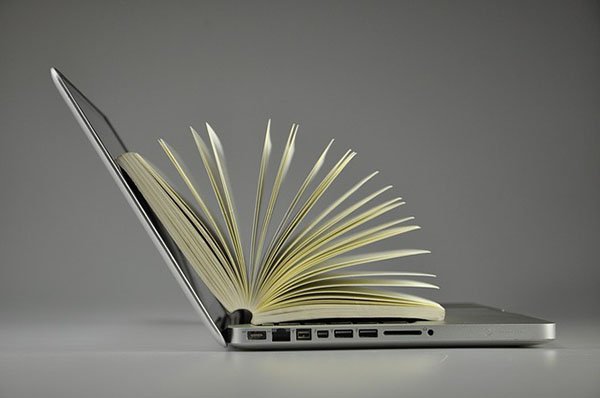
Live Audio Broadcast: Content is king, but the data is an even bigger king.
My first company in 2003 was called Thumb Radio. Thumb Radio wanted to bring every radio station on the planet to your cell phone before there’s an App Store and before there was an iPhone. Imagine people thought that I was pretty crazy. A skinny black kid from DC wanting to put all this content in the cloud in 2003. I was literally told by investors, “Nobody’s going to listen to music on your cell phone.” We ended up partnering with Clear Channel because we wanted to get access to their radio stations and they wanted to use their stations in a more technologically advanced way. It was a great partnership and we ended up being the first company to stream Clear Channel radio stations on a mobile phone.
We get our shows on things like iHeart, iTunes, Echo, Google Play. If it’s getting the numbers back of your plays, the radio stations have to buy into Nielsen or whatever it is that they buy into to get their numbers. iTunes doesn’t share the plays that I could find. Does iHeart share? How do we get our data?
The other thing that nēdl does that’s so exciting is that we actually allow you to create your own live radio station on our platform. You literally don’t need to buy a tower or set up at $10,000 to $25,000 like your setup is probably for your podcast. You tap one button on your phone and you go live. As you’re live, every word that you say gets indexed into our database and become searchable. We convert the audio into text so that you can be indexed right next to MSNBC, CNBC, Fox Sports News, ESPN, CNN, whatever’s on our platform. If you’re saying the same things as they’re saying, then you’re indexed in real-time right next to them.
Let’s say my show got on your app because it’s on AM/FM. Where does my data go? I know people could listen to it online and you say it’s searchable, but is it only the information that’s searchable? What’s exactly searchable and can they actually read anything like transcribed data?
What we’re rolling out is that after you complete your live nēdlcasts, while you’re doing your AM/FM show, you can do it live on nēdl. You tap a button, you’ll be live on nēdl as well, which puts you in over 54 million homes through our Alexa App. It puts you on Android Auto. It puts you on all Android phones as well as iPhone. After the show, what we’re going to be rolling out is we’re going to give you that transcript. We’re going to give you that recording so you can repurpose it and do whatever you like or you can even put it on a loop right here on nēdl.
If you want to take that and make it into a blog or whatever, you copy and paste it into your blog and attach your recording and you’re done.
Of course, analytics comes with that. We’ll be rolling out the analytics suite. You’ll have all the analytics about when somebody tuned in, when somebody tuned out, what are the words that made people tune out.
Is it only when they went in through your app though? You don’t get how many times it’s played on iHeart. You get how many times it’s played through your app.
[bctt tweet=”You’re entitled to your own opinions but not on your own facts. ” via=”no”]We see a huge opportunity in the market where these bigger guys aren’t providing that data. They’re not providing that help to broadcasters like you.
Why aren’t they?
They say content is king but the data is even bigger king. That’s important for their business model but our business model is a different one. Ours is based on empowering broadcasters. Broadcasters win on nēdl then we win. We’re doing everything we can to empower live broadcasters.
I downloaded the app and I was able to get in for free. How are you monetizing this?
You can broadcast. To listen is free and it will always be free, but you can broadcast for free for nine minutes per day. If you’re a casual broadcaster or you’re getting your feet wet and trying to see if podcasting is the thing for you, then tap the button and go live for nine minutes. If you’re creative, you can do it right before midnight and do it for eighteen minutes. We charge if you want to go beyond that a monthly fee. It’s $80 a month. We may do some specials. The idea is that if you’re going to start a legit podcast, you’re going to spend upwards of $20,000 to $25,000 to get started. We’ve priced so that you can start a legit podcast for pennies on the dollar.
What costs so much for the $20,000 to $25,000 in case people are wondering why they would need to spend that much?
People are buying equipment. They’re buying sound effects studio time. In some cases, they’re getting consulting that goes with it. It’s a whole big deal and it’s very intimidating for a lot of people. We’re saying, “Everybody’s voice counts.” What’s really unique about nēdl is that there’s no algorithm that stops you from being heard. Whatever you believe about Donald Trump, there’s no question that Facebook was involved in the last election in a very negative way. They were pumping up the algorithms themselves. They were pumping up negative and suppressing things that weren’t controversial. “It’s a beautiful day now,” nobody saw it and none of your friends saw that. Only your mom saw that, but if you said something negative about your neighbor, everybody saw that. We don’t think that’s freedom of speech. What good is freedom of speech if nobody hears you? There’s a line in the matrix, “What good is a phone call if you can’t even speak?” That’s very much the truth with social media. We’ve taken all of those algorithms out, stripped them all out and said, “Your voice is the thing that matters. If you’re speaking about what’s relevant, people will find you.”
You’re focusing on live shows. You can download the podcast app from iTunes and listen to whatever, whenever you want. Is there a reason you wanted to live because it’s radio, is that it? The podcast doesn’t make that much money and you’re focusing on live for that reason?
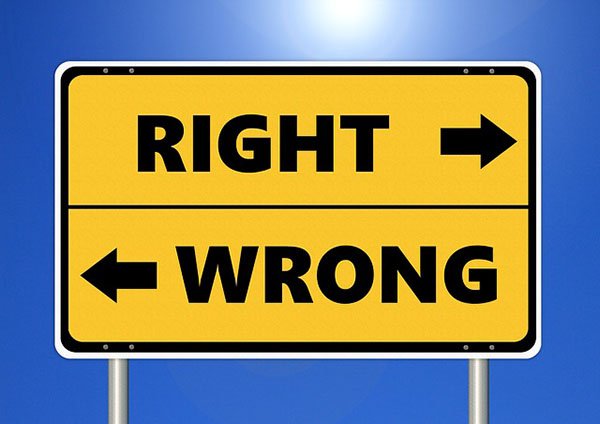
Live Audio Broadcast: Ethics is that mindset and that consciousness that your actions make a difference and you have a role to play in the world.
You make a lot of money but most people have lostcasts. It’s trying to be discovered but what we think the case is the people who care the most about having the podcast whenever they want it is the super uber, I won’t say busy people. Working stiffs like many people in the US are busy people. When I was working twelve jobs to get through college, I was pretty busy. What we find is that the subscription class of people, they want what they want when they want it and they don’t settle for anything less. That’s great for podcasts but for us, we think that it’s more than just live and a subscription-less free thing. It’s more like people that we’re catering to want to listen with other people. They want to share that and they want to know. That’s what radio is. When you turn it on, even if you can’t see the person, you know you’re listening with other people and you feel that community. That’s what it’s really about.
You won’t be able to get old episodes if you miss something then or not.
We’re putting podcasts on loop and we’re partnering with big podcast companies to do that. You’ll have the ability to hear old shows. Our primary focus is on allowing people to access any information. We’re democratizing access to information and the microphone itself. All the podcasts in the world can be on our platform but they won’t be like you deciding when you listen to them. They’ll be in progress with other listeners so they can join the conversation, comment and do all that stuff that you do with the community.
You’re very good at communicating. You were a speechwriter in Stafford. You were a Message Advisor for President Obama, what does that mean exactly?
I was in the right place at the right time. I was one of those crazy people that donated the very night that he announced and raised $1 million. That was a big deal back then. I was one of his very first volunteers and in LA, it was almost subversive. Think back to 2007, you had this African name running for the presidency in the United States after George Bush for a few years. It felt extremely subversive. It felt like you were doing something that was crazy. If you were around, you’re one of the few people who were putting your chips behind this guy. I got a chance to meet David Axelrod and Reggie Love. We kept in touch and I would send an idea and they would use it.
Use it for what though exactly?
I sent various campaign ideas. One of the ideas was that during the ride, Hillary Clinton was attacking Barack and making him focus on the minutiae. I sent an idea, “He’s got friends all over the world. Let’s do a world tour.” They did it and he brought out hundreds of thousands of people in Germany and hundreds of thousands of people everywhere he went. It elevated the conversation from the minutiae of what he was or wasn’t doing to this grand conversation about him as a world leader. It was very effective.
Probably, the thing that I remember the most about the speechwriting opportunity, it was before the South Carolina primaries. I was super worried like everybody was on the campaign. We were working so hard and at the time, I hadn’t even been hired yet as a staff but I went to bed that night praying. I was like, “God, please help me help him. Help me come up with something that can help him.” That morning I woke up with the words, “The fundamental choice in this election isn’t the choice between black or white, rich versus poor. The choice in this election is a choice between the past versus the future.” I sent that to the campaign not knowing that they were going to use it at all. I sent it to David Axelrod and then that night while licking envelopes, watching the acceptance speech, he said my words and I was floored.
[bctt tweet=”Being open-minded doesn’t mean we’re going to be accepting every belief is valid. It means accepting the possibility.” via=”no”]You have a very interesting assortment of things that you’ve done. I know you have many years in radio and you have that. This isn’t the first business that you’ve found. I’m curious by the name you picked, nēdl.
I love the names. I changed the name of the mascot in elementary school. I won the contest and got my little backpack for the Tacoma Park Puppies. I came up with that. That’s my legacy. About the search engine, we’re thinking needle like a needle in a haystack but needle’s taken. I started to look for other names. I wanted to understand what the definition of a needle was by Google and I looked it up. Under needle is the phonetic spelling, nobody owned it so we bought it.
Needle to me, I almost think when you dropped the needle when you played a record.
If you’re old enough like me, the needle on the radio dial.
I was thinking of both as I read it. That’s a great name. Can you share how people can get the app, contact you or anything you want to share?
You can contact us on Facebook or Instagram @NedlApp. We’re also on IOS, Android, Android Auto or Alexa. We launched the web as well, Nedl.com.
It’s so nice of you to join me and thank you so much for being on the show.
Thank you, Diane.
The Impact Of Good Ethics In Life and Business with Yonason Goldson
I am with Yonason Goldson, who is the Director of Ethical Imperatives. He teaches professionals how good ethics is good business and the benefits of intellectual diversity. He’s a keynote speaker, TEDx presenter, community rabbi and he calls himself a recovered hitchhiker. He has done a lot of very interesting things. I’m looking forward to our chat. Welcome.
Thank you, Diane. It’s great to be with you.
Are you in St. Louis?
I am where we go through the cycle of seasons every few hours.
Both of my parents were born and raised in St. Louis. If you’ve seen Brown Shoe Company, they actually bought out. They’re now Hamilton Shoe Company. When I get back there, it’s fun to see the whole St. Louis scene because I never got to go there when I was a kid. It’s nice of you to join me because I’m interested in what you deal with. I’ve taught a lot of ethics classes and ethics is a really fun thing to teach because it’s subjective. You can get people all riled up in very interesting discussions. What got you so interested in focusing on ethics?
I was a career high school teacher, taught in a Jewish School through studies for many years and my school closed a couple of years ago. Forced retirement and I had to decide what I wanted to do when I grow up. I love communicating ideas. I love teaching in the classroom. I loved it when I could communicate to students new ways of looking at their world and might as well themselves. I wondered what I could do with that skill outside the classroom. Many years of dealing with teenagers, after a while you’re ready for something a little different. I started venturing into the realm of professional speaking, joined the National Speakers Association and in crafting my message, what I eventually happened upon or focused upon was ethics. Ultimately, that’s what my tradition is all about.
Ethics is subjective. It is to a point, but for society to function. This is something that Stephen L. Carter points out in his book, Civility, right at the outset. He says, “Civility is the basis of civilization both linguistically and philosophically. It requires us to have an awareness of how our behavior affects those around us.” Ultimately, that’s what I believe ethics is. Ethics is that mindset and that consciousness that my actions make a difference. I have a role to play in the world. I have a contribution to make. I’m a member of something larger than myself. That’s why I get so frustrated when we have these political arguments about people’s rights, my rights versus your rights. We’re always going to be butting heads, but if I’m focused on my responsibilities and you’re focused on your responsibilities, then we’re always going to be looking for ways to meet in the middle wherever that middle might be. That is the value of ethics in our personal lives, family lives, political, society but also in business. That’s what creates a healthy business environment that allows people to thrive and succeed in the professional world.
[bctt tweet=”What good is freedom of speech if nobody hears you? ” via=”no”]I write about perception so that ties into a lot of that. You talked about being aware of your responsibilities. How do you determine what they are though? Are we getting back to subjectivity again if my idea of what I’m responsible for isn’t the same idea as what other people think it should be?
That is tricky because when you go from culture to culture, when you go from one situation to another situation, there is a certain amount of fluidity. When I give my keynotes, the acid test that I suggest is if I asked myself honestly, “What would it be like if everyone did what I’m about to do? If I look at the world, if I look at society, everybody is acting the way I do, is that a world I want to live in? Is that a world that is going to be beneficial for people to live in? Is that a world that is going to start coming apart at the seams?” A lot of it really has to do with us being honest with ourselves, whether it’s willing to question our own motives, question the effects of our own actions and question the impact that we’re having on the world around us.
The impact is a fascinating discussion. You talk about compliance being the enemy of ethics. I was looking at that and it’s interesting because it ties into my talks I give about curiosity. If people are complying, they’re doing status quo thinking they’re not really innovative. What do you mean by compliance and how is it the enemy of ethics?
Ethics ultimately governs the gray area between what’s legal and what’s illegal. One of my favorite illustrations, the United States government for ages has been trying to get us to use these $1 coins. For some reason, Americans don’t want to use them. £1 coin is very popular in Britain. We don’t like them for whatever reason. At one point, they had an incentive program. They said, “You can order up a roll of $40 coins online, put it in your credit card, we’ll ship you the coins postage free,” and this will be a way of getting them into circulation.
Some clever people, they ordered a lot of coins, put them on their credit cards, go to the bank, put it right back into their account and rack up all those credit card points. It didn’t work, but on an ethical level, they weren’t breaking any laws. There was no contract but it clearly was not in the spirit of the offer. Compliance is an effort to legislate ethics and that by definition, I believe has to fail because ethics has to be a mindset. It has to be that attitude and that world view that is willing to ask, “What’s the right thing to do? What do I do in this gray area? How do I find the proper avenue, not what can I get away with?”
You talk about all the things that people do, what we should do and what we shouldn’t do it. It brings to mind a course I teach in leadership where we get into Mackey’s Conscious Capitalism. We talk about ethics and profits and it looks like you talk about that stuff. For leaders who think they have to choose between being ethical and profitable, is there a fine line? Can you be both? How do you respond to that?
Lance Armstrong.
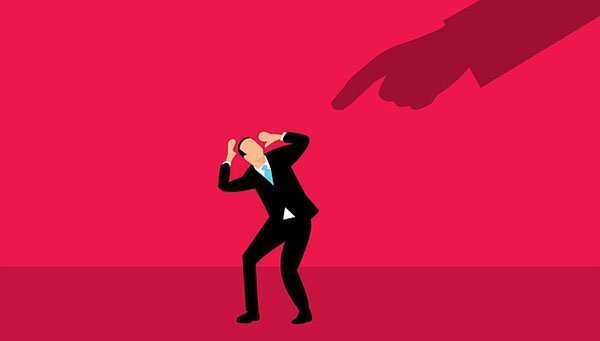
Live Audio Broadcast: We become hyper-defensive about anything that challenges us because we’re terrified that we may actually be supporting a position that’s not a legitimate position.
Before or after he was caught?
Exactly, he was on top of the world. He was an American hero. He was an icon. The greatest guy ever lived until his past finally got caught up with him. Where is he now? I have no idea but I don’t think he’s doing terribly well. The idea that I can get away with things or even worse that I have to get away with things because it’s a dog-eat-dog world, nice guys finish last and no good deed goes unpunished. It was such corrosive mindsets and attitudes. If you look at certain businesses, I’ve only heard stories about Zappos, the shoe company. They supposedly have this incredible culture where people love to work there and they put the clients first. They put the workers first.
I watched a TED Talk with the guy who started Chobani Yogurt. It’s an unbelievable story about how he went into tremendous debt to buy this yogurt factory that was closing down and all these people are going to be laid off. It tore him up to think all these people are going to be out of work and he started this enterprise from nothing. Now it’s thriving and it’s created countless jobs, and he’s given his workers shares in the company. I’m sure he’s doing very well. He didn’t have to trade success to be good. He found that balance between the two. Trader Joe’s, everybody loves working and everybody loves shopping there.
I don’t claim to understand this but the degree that I do, I’m here to talk about blockchain, which if I understand it correctly is the idea that you create an economic community where reputation keeps people in check. If you lose your reputation, I’m not going to be doing business with you. That’s such a wonderful model because it forces us to be aware that I am my reputation. We understand it to a certain degree. I am my brand. Think about United Airlines and Wells Fargo, they’re self-destructive because they didn’t have an awareness of how important brand image is. They didn’t allow it to permeate their culture. I would argue that even if you can get away with things in the short-term, any business owner, managers, CEO, you’re going to do much better in the long-term. This is even demonstrated. Certain studies are showing that companies that are rated highest in ethics grow faster by as much as 5% over companies that aren’t.
I can think of an assignment on one of the courses that I teach where they talk about examples and Zappos comes up a lot, Costco and Southwest Airlines. A lot of them come up as places people want to work because of a certain culture. I also teach some marketing courses where we get into the United Airlines and Wells Fargo issues but the reactions people have to any advertising with the Gillette ad that got such a focus. Do you think we’re getting too hypercritical of things at this point or is there an ethics crisis and are we overreacting to things?
We’re definitely overreacting but the level of hypersensitivity and this is an idea that I really want to explore. How simultaneously we have this rise of runaway political correctness where you must be so careful, the safe spaces, oncologist and you have to watch everything we did. Here in St. Louis, an NPR radio show host, an 80-year old man who’s been in the business his whole life, he was interviewing a former colleague who was a 75-year old woman who had come back to town. They hadn’t seen each other in years and he sits down, he says, “Good morning. You look fantastic. You look great.” His manager called him in after the show and told him, “You shouldn’t have said that” and he quit on the spot. At the same time, we’re so hypersensitive to every little word and nuance, you have the ramp of incivility in politics, online and some talk radio or cable TV. What’s acceptable there is so far beyond the pale of what used to be considered professional at any level. How do we have these two phenomena that are coexisting where you can’t say anything on the one hand and on the other in a different area, you can say absolutely anything you want. There’s some serious disconnect in our values.
It’s hard to listen to the news because you get one extreme or the other. Social media does have a definite play in this. People are unfriending each other for comments that they’re making in social media. They take it this very passionately that everybody has to agree with everything that they’re saying. Are we sharing too much of our opinions and our values or are we too sensitive to other people’s reactions to them?
[bctt tweet=”If the decision is made in a way where everybody has his say or her say, everybody is able to contribute.” via=”no”]One of my favorite quotes is from the late Senator Daniel Moynihan. He said, “You’re entitled to your own opinions but you’re not entitled to your own facts,” but these days, facts are irrelevant. People don’t care. I believe what I believe because that’s what I believe. The groupthink has isolated into these little enclaves where every conversation is an echo chamber. If I actually do some of these talk shows, they’ll allow somebody from the other side to come on but it’s not debate, it’s not a conversation, it’s a shouting match. It comes back to ethics because if I believe I’m right, what am I afraid of? Why do I have to misrepresent somebody else to make me look good?
Why do I have to ignore facts? If I’m wrong, I would like to know that I’m wrong so I can stop supporting an erroneous position but that makes me an outlier. We were too invested in the political labels that we don’t let ourselves know other people. We don’t listen to their points of view and therefore, we don’t know ourselves. We don’t know whether we’re right or wrong. We become hyperdefensive about anything that challenges us because we’re terrified that we may actually be supporting a position that’s not a legitimate position.
It’s so hard to even talk about anything political. I avoided in general on this show because you get haters that’ll write all kinds of things on your site. That’s not what I wanted this to be. I wanted it to be a pro success business type of show. As you’re talking about some of this, it brought to mind The Tonight Show. George Carlin and Ann Coulter were both going to be on the same show. I was so looking forward to seeing how that went. I remember thinking when George Carlin was on first and then Ann Coulter came out, he got up to move over when she was the next to be interviewed and he said, “I can’t believe I moved to the right for Ann Coulter.” I thought it was cute and funny but that was all they said. I was like, “Was that it?” Do we want people to battle it out? Are we looking for a good show?
That really leads to another topic. I’m very fond of how our society is increasingly becoming the Roman Empire. The gladiatorial combat is carried out in sports arenas and it’s carried out in cable TV and then talk radio. The more blood, the better, the more the spectacle, the better. You get in a good zinger and that makes it all worthwhile. Whereas the person who actually wants to present a cogent argument, nobody has the patience for that. When was the last time you heard on any of these political discussions somebody said, “That’s an interesting point. I never looked at it that way.”
If we want to get back to a business context, I’m reading Team of Rivals about Abraham Lincoln’s administration. Lincoln surrounded himself with people who are former rivals, former enemies and from all different points of view and contrast. His predecessor, James Buchanan, surrounded himself with people who are going to tell him exactly what he thought. Buchanan is really responsible, for too many historians, for the Civil War because he simply let things continue to deteriorate rather than addressing them. Lincoln recognized that the only way there’s any chance of preserving the Union is to have every point of view represented, give everybody their say and then have all the different views and all the information available to make the best possible decision.
It’s nice if we can have an open mind. Since we’ve already touched on politics, why not hit religion since you’re a rabbi. If we can’t all agree on religion, how can we all agree on ethics? My ex-brother-in-law used to say, “If we all had the same taste, we’d all want to date your mother.” I thought that was a crazy comment but I know what he meant. He’s saying that we all are going to be different so we’re not going to all ever see eye-to-eye on certain things. Do you think it’s possible for everybody to have the same ethics? Isn’t that the same thing as saying we can all agree on the same religion?
I don’t think so. Certainly, as an Orthodox Jew, I’m a minority within a minority. One of the best compliments I was ever given was from a fellow teacher I was chatting with one day which was a Christian. He said, “You’re the most Christian person I know.” I think that as high praise. We could sit down and we could start getting into a theological debate but to what purpose? We have so many values in common. We believe in holding ourselves accountable. We believe in a society based on justice, mercy and charity. We believe in traditional views of the world, it’s fairness, equity and peace. Why do we have to find the one thing we can’t agree on and make that the defining factor in our relationships?
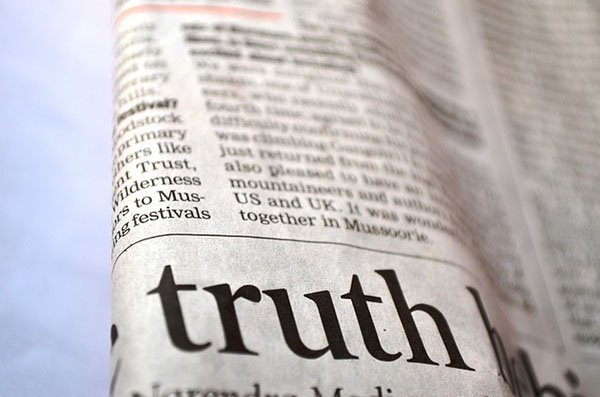
Live Audio Broadcast: The truth may lie in unexpected places. Accept the possibility that our perception of truth may not be infallible.
What about facts are irrelevant? How are people starting to think that way? Does that tie in at all to that?
I wouldn’t be a practicing Jew if I didn’t believe this was the truth, but that doesn’t mean that I have to carry the torch from my point of view. There are more fundamental universal values and people who are committed to being good people, people who are committed to making the world a better place. That’s what human beings are here for. That’s why God created us to bring goodness into the world, to fight for justice and charity. If we’re on the same page about that, then we can agree to disagree about what we’re going to call our God or how we’re going to worship.
I don’t really care if somebody is a Christian, a Muslim, a Hindu or a Buddhist and even people who don’t have any particular theology. I can be friends with an atheist but people I can’t be friendly with are militant atheists who are determined to tear down religion at every opportunity. I don’t recognize the benefit of doing that. I don’t particularly want to be involved in discussions with such people because they tend not to be very open-minded either. Let’s find common ground and this comes back to politics and certainly back to the business that different people in an organization have different ideas about how things should be done.
Sometimes people are not going to agree on what’s best for a company or an organization but there has to be a decision made at some point. If the decision is made in a way where everybody has his say or her say, everybody is able to contribute, everybody’s voice is heard and is reasoned out, the solution or the course of action is arrived at with a certain amount of consensus, logic, and thoughtfulness. Even if I don’t agree with it, I can say, “I understand the process that led us here and I can get on board with what we’re going to do, even though my opinion didn’t carry the day in the end.”
Are we getting too much fake it until you make it mentality? Is that what happened at Theranos? Some of these other companies we have to be puffer fish to seem that we have something until we actually get it. It seems to be the mentality where we’re hearing. Is that an ethical problem? Where does that stand in your book?
That’s a little more nuanced. The fake it until you make it is a nice sound bite. Amy Cuddy has the second most watched TED Talk in history. From what I understand, most of the science behind has been debunked. Apparently, the physiological effects of the Wonderwoman and Superman pose and that stuff, even her colleague has backed away from that and maybe even she has. She says there’s still a certain psychological benefit to it. There are certain ways we can trick ourselves into being confident, into acting confident but it’s not a substitute for real talent, for real ideas and for real strategies.
I want to get more into the business aspect of it. Like Theranos, where she claimed that her company could do something that it really hadn’t gotten to that level yet. They intend to create this ability to take your blood from a drop and do these amazing things, but their equipment can’t do it yet. They’re faking it like they can until they get to that point. I’m looking at it from that perspective instead of the individual. There’s that mentality that for VCs to be interested, it has to be so big. Everybody wants to invest in Elon Musk, nobody wants another old company anymore. Do you think that we’re pushing ourselves to push our sense of ethics? Are we getting pushed into this level of faking it until we make it because that’s the only way you can compete anymore and what happens to our code of ethics then?
[bctt tweet=”There are certain ways we can trick ourselves into acting confident but it’s no substitute for real talent, real ideas, and real strategies.” via=”no”]I hadn’t really thought about that in those channels. You’re absolutely right that it’s not enough to have a good idea. Every idea has to be grandiose. Every idea has to change the world. When we create that pressure or that expectation then we’re setting ourselves up for failure. There has to be a willingness to look at reality, to see reality and find out where I am. What is this idea going to do? One of the greatest ideas I’ve heard are these microloans that are being given particularly to people in Third World countries. A few hundred dollars in those countries is enough to turn these people’s lives around. If you look at it in a microcosm, I’m giving one person $500, how’s that going to change the world? You’re going to change that person’s life but instead of having to invest $1 billion in one project, I can invest in thousands and thousands of people. Many of whom are actually going to be able to turn their lives around. Look at the collective impact of all those individuals with this modest idea instead of the one great big idea, which is fake it to make it and maybe too grandiose to succeed.
A lot of people can learn so much from what you talk about. I know your site is EthicalImperatives.com. You’ve got TED Talks and you’ve written five books. Is there any other information that you’d like to share?
It’s funny, I was interviewed. At the end of the interview, the host asked me, “What are three words that you would use to describe yourself?” I wasn’t ready for the question. I had to think about them. The first one that came to my head was curiosity. I don’t think I’ve ever used to describe myself before. Curiosity has a lot to do with what we’re talking about because if I’m over-invested in my point of view that I’m not willing to entertain other ideas, then I’m closed off. I’m not interested in the truth. I’m not interested in discovery. I’m not interested in reality. I’m interested in protecting the view that I have acquired and that’s an incredibly dangerous situation. When we talk about being open-minded, it doesn’t mean we’re going to be accepting every belief is valid. It means accepting the possibility. The truth may lie in unexpected places and accepting the possibility that my perception of truth may not be infallible.
Thank you so much for being on the show. I didn’t know we’d go to so many unusual places with this and I’m so glad we had a chance to.
It’s absolutely my pleasure, Diane.
I’d like to thank both Ayinde and Yonason. We have many great guests on the show. If you’ve missed any past episodes, please go to DrDianeHamiltonRadio.com or go to CuriosityCode.com for the curiosity information. I hope you join us for the next episode of Take The Lead Radio.
Important Links:
- nēdl
- Ethical Imperatives
- iHeart
- Clear Channel
- Facebook – nēdl
- @NedlApp – Instagram
- IOS – nēdl
- Android – nēdl
- Android Auto – nēdl
- Nedl.com
- Civility
- Conscious Capitalism
- Chobani Yogurt
- Team of Rivals
- Amy Cuddy
- EthicalImperatives.com
- CuriosityCode.com
About Ayinde Alakoye
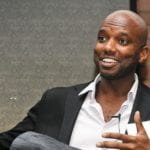
About Yonason Goldson

He’s studied at the University of Edinburgh, taught school in Budapest, Hungary, and seen Richard III performed in Ashland, Oregon, and Stratford-on-Avon. He’s been a professional speaker and teacher for over two decades, published five books, raised four children, and been married to the love of his life for over 30 years.

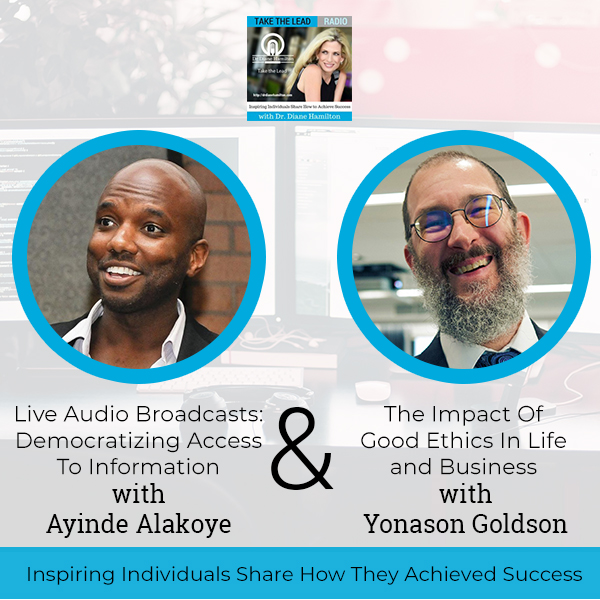
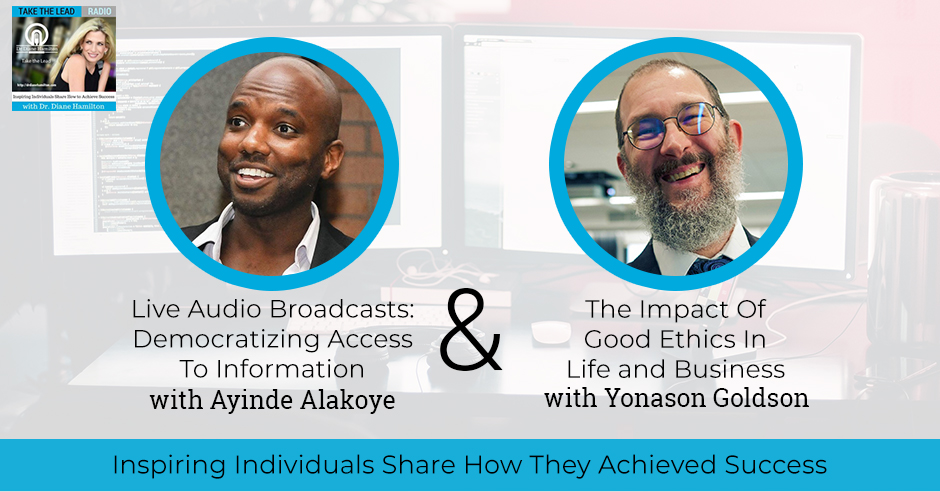

0 Comments